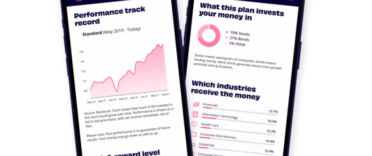I have received my annual statement for my Stakeholder Pension and I have paid in £2,400 over the past year. I've paid into the scheme for the past 10 years on an index linked basis. The statement shows I would get £233 per month at aged 60 at today's prices. It does make me wonder if it's worthwhile continuing to pay in for such a small return. I would be grateful for your take on this.
Thank you.
Greig
My response:
Grieg
It's a really interesting question and there is no magic bullet answer, but as you say I can give you my take on it.
First of all it's great that you are saving for retirement in the first instance so don't be too downbeat. But are pensions any good?
Options
If you plan to save for retirement then then your options generally fall into a) stick your money under the mattress b) put it in the bank c) invest it in some way.
(The best option is to get a free pension funded by your employer but not everyone is that lucky. So I’m ignoring this option, as you don't mention it, as well as your state pension entitlement).
The problem with sticking your money under the mattress is that inflation will eat away at it. You can ask just about anyone of a certain age and they will bore you with tales of how they bought their 4 bedroom house for a few grand 40 years ago or how a pint of beer cost 1p. These increases are in part due to inflation and show the devastating effect it has on the 'real' value of money. Propping up the mattress with stacks of cash is not really a serious option if you want to protect the spending power of your retirement fund.
The next option is to pay your regular savings into the bank and earn interest on them. The only real risk to your money is that your bank goes bust. The problem with this route is that you are taxed on the interest but this can be avoided by using Cash ISAs. As long as you get a decent (inflation beating) interest rate then you may feel this is not a bad option for you. But interest rates are currently derisory and again inflation is an issue.
The next option is to invest the money you save with the hope of inflation beating returns. Whether it is via a pension, an offshore bond, a Stocks and Shares ISA etc your 'retirement' pot will usually be invested in funds (unless you know what you are doing and deal directly in share holdings). Ignoring the intricacies of each tax wrapper (as that's all they really are) you generally can invest in much the same things in all them. So accepting this general assumption then it really comes down to the choice of investment wrapper itself.
Pensions are tax efficient
A pension is incredibly tax efficient as you get tax relief on your money going in and then tax free growth on the pot going forwards. For a 40% tax payer for example, they effectively get a 40% boost to the amount they invest. ISAs on the other hand don't enjoy such tax treatment on the way in. But on the plus side the fund grows tax free and all income and capital gains derived from it are also free of tax. Any income from a pension pot is taxed by comparison. But if high earners are smart enough they can ensure 40% tax relief when building a pension pot on the way in and then only 20% tax on the income they draw in retirement (by ensuring they remain a basic rate tax payer).
So from a tax perspective pensions make a lot of sense. But the complexity of the rules surrounding them as well as their relative inflexibility when it come to taking your retirement income put a lot of people off. Any money in a pension plan is locked away until you are at least 55. Understandably some people fund for their retirement through Stocks and Share ISAs instead. Yes you might not get the tax relief uplift on the way in but you can access the money at any time.
Pension projections are inaccurate
This then leads me back to your point on the level of income you are predicted to receive. First of all, it is only a projection. I don't know your age but the further away from age 60 that you are the more inaccurate the prediction will be. Also, the prediction is likely to be based on an assumed steady growth of around 5%. Completely meaningless in my eyes.
Ultimately you will likely purchase an annuity with your pension pot given that you have a stakeholder plan (drawdown is an option but would usually require you to move your fund in to a more sophisticated pension plan such as a Self Invested Personal Pension - SIPP). When you come to retire you can shop around and find out which insurance company will give you the best annuity rate. Of course annuity rates vary over time, sometimes going up sometimes going down. So the level of income you secure with your pension fund will be depend on the annuity rate you secure when you come to retire. This is down to a whole host of factors including mortality rates as well as returns on gilts.
But the upshot of this is that the projection will assume an annuity rate which might not end up being comparable to that which you actually get when you turn 60. Also the annuity will be assumed to be payable until the day you die. So from an annuity provider's perspective the income has to be sustainable/profitable. While annuity rates can seem pretty stingy imagine if instead of having to buy an annuity you were given your pension fund and told to live off it for the next 30 years. If you were to budget to make it last you'd again be living on a few hundred pounds a month – or you blow the lot in just 10 years.
Boost your retirement income
In order to boost your potential retirement income you need to keep costs low (as management charges hammer investment growth), save more and shop around for the best deals (be it on annuity rates when you get to age 60 or the best ISA savings rates). Your disappointing return is not the fault of 'pensions' as a concept itself but of the product, fund performance and charges hitting your pension pot. While you have gone for a low charging Stakeholder plan, which is admirable, the investment choice will likely be limited and full of poor performing funds run by the insurance company themselves. But putting that to one side the figures you quote are not unsurprising. It juts highlights how much we need to save in order to have a decent retirement income.
But saving for retirement in any form is a positive move. Pensions were designed as an attractive way of doing this. Unfortunately the complexity of the rules surrounding them, as well as the constant amendments to these have diminished their attraction to a lot of people. Plus they tend to benefit wealthiest portion of society more than any other.
Is it worth continuing to pay into a pension?
So is it worth continuing to pay into your pension plan? It certainly is worth continuing to save for retirement in some form at least. But seek independent financial advice on the issue as there may be more suitable options out there for you.
As I said earlier some people use ISAs to save for their retirement, but even this is not ideal for the wealthy due to the small annual amount you can invest in them each year. Your next question is probably, 'why don't I just invest in property'? I plan to cover this in more detail in a future article. But the problem is that property is just one asset class so you really are putting all your eggs into one basket. If you had invested solely in property and then planned to retire after the 2007 property bubble then you would have seen your retirement income slashed. Betting your retirement on one asset class is gambling rather than investing. Plus pensions and investments allow you to diversify your portfolio into other area such as shares.
Summary
I'm certainly not anti-pensions and they still remain the most tax efficient way to fund for retirement, particularly if you are a high rate tax payer. Disappointing returns are likely to be more indicative of poor fund management and extortionate charges than a wider problem with pension saving in general. But whether you carry on with your pension is really a personal decision. Although it would seem sensible, whatever you decide, that you maintain your current retirement saving discipline.
I’d love to hear other readers' views on pensions, so please leave a comment below:
The material in any email, the Money to the Masses website, associated pages / channels / accounts and any other correspondence are for general information only and do not constitute investment, tax, legal or other form of advice. You should not rely on this information to make (or refrain from making) any decisions. Always obtain independent, professional advice for your own particular situation. See full Terms & Conditions and Privacy Policy.





